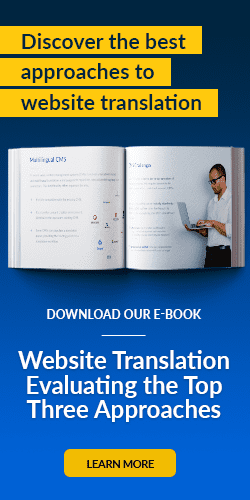International customers want world-class user experiences, presented in the languages they speak. But localizing your transactional website with in-house staff is painful, complicated, and comes with the following pitfalls:
- Endless workflows and ballooning costs
- Slow speed to market
- Maintaining brand consistency
- Compatibility with payment platforms
The Cost of Translation: The Price Beyond Words
Deploying and operating multilingual websites demands continuous effort and unexpected costs that go well beyond mere translation. Marketing teams rarely have the staff, technologies or expertise to efficiently cope with the challenge.
Here are just a few of the many costly burdens you and your team inherit if you bring the project in-house:
- Finding and compiling all translatable website content (such as text, images, multimedia, PDFs and more)
- Acquiring the resources to create and manage workflows to translate that content
- Processes for quality assurance and project management
- Getting content translated quickly and accurately
- Integrating the translated content into the proper global-market “instance” of your multilingual CMS
- Ensuring the translated content displays properly on-site, and doesn’t “break” page designs due to translation-related issues
- Following this complex and costly process again and again, every time you add or change content to your website
Marketing teams rarely have the staff, technologies or expertise to efficiently cope with the challenge of website translation.
Keeping Up with the Speed of Retail
B2B companies offer services or products that tend to remain consistent year-round. Their website content is generally static. But with transactional websites, especially B2C, it's a different story.
Things move fast in retail. You're often contending with ever-changing inventories due to:
- Seasonality
- Releases of new product lines
- The ebb and flow of customer demand
- And more
With so much in flux—and with in-house translation workflows and processes often taking weeks to localize and publish new content—translated websites quickly become out-of-date.
This spells disaster for companies who want to stay relevant in global markets.
Consistency is Key
Your brand voice, messaging and overall image have been meticulously crafted to attract customers in your primary market. Ideally, this effort should carry over into global markets.
But things aren't always that simple. For translations to consistently preserve your brand's voice, you need a translator with linguistic fluency, cultural fluency-and industry-specific marketing know-how. That's a rare breed indeed. Now imagine trying to find several, to create your internal translation team.
Even if you find these unicorns, you must still consider how to apply your localized brand voice and messaging across all of your channels. From emails, to social media posts, to offline marketing, you must maintain brand consistency to give international customers the seamless online experience they demand.
You need translators with linguistic fluency, cultural fluency-and industry-specific marketing know-how. That's a rare breed.
Playing Nice with Others
Transactional websites are especially complex, from a technological perspective. Under the hood, they have an intricate ecosystem of CMSs, databases, coding and integrations with payment platforms and other solutions.
Building out a localized website means setting up solutions for identifying, capturing and uploading translated content, reconfiguring your tech stack, and hoping that it all works together.
With that many moving parts, there's so much that can go wrong. Errors during the conversion funnel will make global customers bounce, and chances are high that they won't come back.
Look for Effortless Solutions
With so much at stake, don’t use in-house resources for website translation—especially since superior solutions exist beyond your company.
Look for a digital-first website translation solution built to handle the demands of content detection, translation, and integration for transactional websites in a timely and coordinated way. As you evaluate your options, consider your pain points-and look for answers to these questions:
- Is the solution built with the purpose of minimizing the operational complexity and cost you’d face with an in-house approach?
- Is it effortless and turn-key at launch and ongoing, with all personnel, processes and technology provided by the vendor?
- Can it handle the translation, deployment, and operation of multilingual websites while optimizing the customer experience across all channels?
- Can it identify, translate, proofread and publish new content in about one business day?
- Can its translation capabilities extend to emails, product feeds, offline documents, social media and other multichannel content?
- Can it work with any CMS, platform or programming language?
The success of your company's global expansion depends on technologies and processes that eliminate in-house burdens, not increase them. Make sure the website translation vendor you choose has the tech and expertise to help you serve international markets-the right way.
Last updated on January 10, 2018
